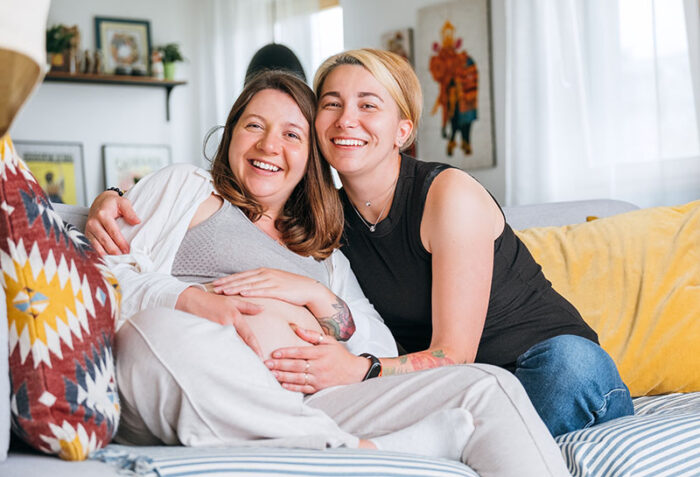ROPA/Shared Motherhood/Reciprocal IVF

What you’ll get
IVF treatment plans are highly personalised to each patient, maximising chances of a successful pregnancy.
We use advanced Artificial Intelligence technology with the EmbryoScope for more informed and more accurate embryo selection.
Choose from a broad donor selection at Portugal’s largest open-ID sperm donor bank, with comprehensive donor profiles.
Speak with our Patient Care Team
Our English speaking Patient Care Team are on hand to answer all of your questions about Reciprocal IVF.
Please complete the form and we’ll be in touch as soon as possible.
Treatment phases

Initial Medical Consultation & Testing
During your first consultation, our fertility specialist will thoroughly assess the medical history for both elements of the couple, and discuss treatment options and details with you. You may be asked to undergo further health checks, to help tailor your treatment and maximise your chances of a successful pregnancy. These include bloodwork, ultrasound of the uterus and other tests for both elements of the couple.

Treatment Plan Confirmation
Once your test results are back you will have a follow-up consultation with your doctor to discuss the results and confirm the treatment strategy and plan. Before moving forward with finding you a suitable donor, you will need to agree to the treatment strategy, plan and estimated costs, that will be provided to you by your dedicated Patient Coordinator.

Finding your Donor
Our Donation Team will work with you to find your ideal sperm donor. At Ferticentro, all our donors are carefully selected, screened and undergo a thorough psychological evaluation process. We only work with non-anonymous donations, which allows us to provide you with detailed donor profiles for you to choose from. Please refer to our Donation Guide for more information.
While boasting the largest sperm bank in Portugal, we also collaborate with European Union-based international sperm banks. Irrespective of the donor’s origin, we highly recommend reserving an adequate number of straws, not only to ensure your current treatment but also to facilitate future options, such as the pursuit of a second child.
All of our sperm donors are pre-screened for a list of baseline genetic tests, following the applicable regulations. However, at Ferticentro we encourage all patients to do the extended panel of genetic carrier screening to check the genetic compatibility between the male partner (or the sperm donor) and the egg donor – we offer tests that allow patients to exclude up to more than 2200 diseases. Please refer to our Genetic Compatibility Tests page for more details.

Ovarian Stimulation
Once you have approved the costs, you are ready to begin treatment. Your doctor will prescribe a tailored hormonal medication plan to stimulate the development of multiple mature eggs in the ovaries of the person who is donating the eggs. We will control the progress of the cycle, until we can verify that the number and size of the growing follicles are compatible with the obtention of viable eggs.

Egg Retrieval
Egg retrieval is conducted under ultrasound monitoring, by an experienced IVF doctor. This operation is performed under sedation and takes around 15 minutes. On the same day, a member of our team will liaise with you to arrange the scheduling of the embryo transfer to the other element of the couple. Eggs obtained from this procedure are then placed into a special culture medium.

Egg Fertilisation
A fresh or frozen sperm sample from your donor is provided to our IVF lab. It is then treated and optimised in the lab, in order to select the strongest, most motile spermatozoa. In classical IVF treatments, eggs are then placed overnight with a sample of more than 100,000 spermatozoa, to enable fertilisation. Alternatively, our embryologists may use a more efficient technique to maximise fertilisation rates: they inject every mature egg with a pre-selected sperm. This technique is called Intracytoplasmic sperm injection (ICSI).

Embryo Culture
Once fertilisation has taken place, your embryos will be kept in a special incubator under optimal conditions, until the embryo transfer day. The incubator allows us to continuously monitor your embryos and carefully assess their development without touching them. At Ferticentro all of our treatments are done in the Embryoscope and embryo development is carefully monitored 24/7, with the characteristics of embryo development being assessed through complex artificial intelligence algorithms.
If you are undergoing a freeze-all cycle, the obtained blastocysts will be vitrified by our talented team of embryologists until the Embryo Transfer phase.

Endometrium Preparation
The person that will receive the embryo(s) and try to carry the pregnancy needs to undergo an endometrium preparation cycle. Embryo transfer can be done in a synchronised or deferred cycle, depending on factors such as logistics, the need to control certain medical aspects or even the preference of the patients. The preparation of the womb for the embryo transfer can be done in a natural cycle (not possible to all patients), a modified natural cycle or a hormonal replacement cycle, depending on several medical patient-specific factors. At Ferticentro all of our protocols are tailor-made, so this part of the treatment is something that can only be defined later in the process.

Embryo Transfer
The embryo transfer procedure is one of the final stages of the IVF process. Your doctor will place one or two chosen embryo(s) into the uterus of the patient that is carrying the pregnancy, to continue 9 months of development as a completely natural pregnancy. These embryos are carefully selected after a very thorough evaluation by our highly-skilled team of embryologists.

Pregnancy Test
After the embryo transfer you will need to wait for 12 days for a pregnancy test.

Embryo Cryopreservation
Any viable surplus embryos that are not used in the first embryo transfer can be frozen in our cryo-storage facilities and used in a subsequent frozen embryo transfer cycle (for a second child or if the first attempt fails). As both members of the couple have identical rights over the embryos, these additional surplus embryos can be transferred to the same person that received the first embryo or to the other element of the couple. Reciprocal IVF / Shared Motherhood / ROPA treatments are truly shared processes!
